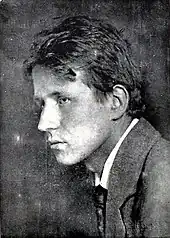Franz von Hoesslin
Franz Johannes Balthasar von Hößlin, also von Hoesslin (31 December 1885 in Munich – 25 September 1946 near Sète) was a German conductor. His second wife was the Jewish contralto Erna Liebenthal (1889–1946).

Von Hoesslin was one of foremost conductors of Wagner's music in the 1920s and 1930s, conducting at the Bayreuth Festival in 1927, 1928 and 1934, and – despite having been exiled – again in 1938, 1939 and 1940 after the personal intervention of Winifred Wagner.[1][2][3] The exile to Switzerland was occasioned after Hoesslin, then music director of the Breslau Opera, refused to conduct the playing of the Horst-Wessel song at a state ceremony. He and his wife were given 28 days to leave the city. Hoesslin responded by one final sold-out concert at which he pointedly conducted Beethoven's Ninth Symphony concluding with Schiller's "Ode to Joy".
The von Hoesslins went first to Florence, but when Benito Mussolini's Italy also presented problems, then moved to Geneva where Ernest Ansermet had invited von Hoesslin to conduct the Orchestre de la Suisse Romande.[4]
Von Hoesslin conducted three performances of Elektra by Richard Strauss at the Odeon of Herodes Atticus in Nazi-occupied Athens in late June and early July 1942. He also conducted two performances of the Ninth Symphony of Ludwig van Beethoven during the same tour.[5]
On September 25, 1946, the von Hoesslins were killed in an airplane accident while returning to Geneva from Barcelona. After missing the scheduled flight and being pressed to conduct a performance of Così fan tutte at the Geneva Opera, the couple chartered a small private plane. The plane crashed in the sea off Sète,[6] killing all on board.
References
- The Amazing Law of Influence, King Duncan, p. 197: "In 1935, German conductor Franz von Hoesslin was almost exiled from Germany for marrying a Jewish woman. At his last concert, he directed Schiller's "Ode ...
- Lauritz Melchior: The Golden Years of Bayreuth, p. 130: "Paul Cornelius, Oskar Ralf (Siegmund), Nanny Larsen-Todsen, Franz Egenieff, Franz von Hoesslin, Lauritz Melchior, Hilde Sinnek, Mrs. Von Hoesslin. Siegfried, Bayreuth Festival 1927, conductor Franz von Hoesslin ...
- Michael Berenbaum, Abraham J. Peck, The Holocaust and History: The Known, the Unknown, the Disputed, 2002, p. 322: "... decision had permitted one of his favorite conductors, Franz von Hoesslin, musical director of the Wagner Festival at Bayreuth, to continue conducting in Germany without hindrance though his wife had been classified a Jew, when Hoesslin, who also conducted Wagner abroad, requested that the obligatory 'J' should not be entered on his wife's passport, this was refused."
- Klaus Goebel Über allem die Partei: Schule, Kunst, Musik in Wuppertal 1933–1945, 1987, p. 89: "Zu nächtlicher Stunde flog er, der Pilot aus Leidenschaft, mit seiner Frau ins Exil nach Florenz. Als Gastdirigent wußte sich Hoesslin in Europa zu behaupten und komponierte gelegentlich. Daß er für seine Frau eine große moralische Stütze war, bezeugt ein Brief an die Witwe des Barmer Komponisten Hubert Pfeiffer vom Jahre 1946. Dieser Brief, im Besitz von Klaus Goebel, ist wohl das letzte Dokument Hoesslins; kurz danach stürzte er mit seiner Frau über der Biskaya ab."
- Kourmpana Stella "The Premiere of Richard Strauss's Elektra in Greece (1942)" Greek National Opera. Stavros Niarchos Foundation Cultural Center, October 2017
- "Franz Balthasar Johannes von Hößlin", geneal.net
External links
- Free scores by Franz von Hoesslin at the International Music Score Library Project (IMSLP)
 Media related to Franz von Hoeßlin at Wikimedia Commons
Media related to Franz von Hoeßlin at Wikimedia Commons